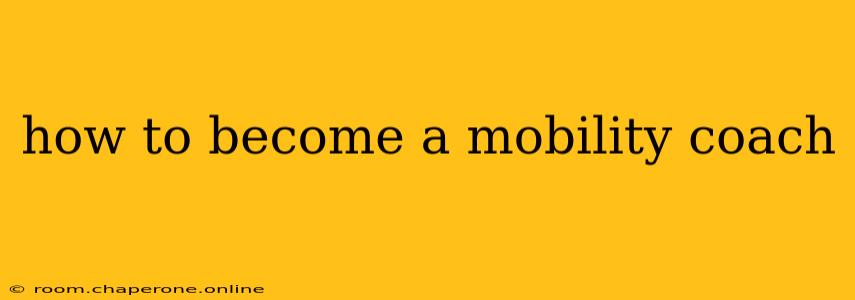Becoming a mobility coach is a rewarding career path for those passionate about helping others improve their physical well-being and independence. It combines elements of fitness, healthcare, and personal training, focusing specifically on enhancing movement and reducing limitations. This comprehensive guide outlines the steps to becoming a successful mobility coach.
Understanding the Role of a Mobility Coach
A mobility coach works with clients of all ages and fitness levels to improve their movement capabilities. This involves assessing their current physical condition, identifying limitations, and developing personalized plans to enhance flexibility, strength, balance, and coordination. Unlike physical therapists, mobility coaches don't treat medical conditions but instead focus on preventative care and functional improvement. Their work often involves:
- Movement Assessments: Evaluating posture, range of motion, and overall movement patterns.
- Personalized Program Design: Creating tailored exercise plans incorporating stretches, strengthening exercises, and functional movement training.
- Education & Empowerment: Teaching clients about proper body mechanics, injury prevention, and self-management techniques.
- Progress Monitoring & Adjustment: Tracking client progress and adapting programs as needed.
- Motivation & Support: Providing encouragement and accountability to help clients achieve their goals.
Steps to Becoming a Mobility Coach
The path to becoming a mobility coach isn't rigidly defined, but these steps provide a strong foundation:
1. Gain a Strong Foundation in Movement & Fitness
A solid understanding of human anatomy, kinesiology, and exercise science is crucial. Consider these options:
- Bachelor's Degree: A degree in Kinesiology, Exercise Science, or a related field provides a comprehensive educational background.
- Certifications: Several certifications can enhance your credibility and expertise. Look into certifications such as:
- Certified Personal Trainer (CPT): Offers a foundational understanding of exercise programming and client assessment. (e.g., ACSM, NASM, ACE)
- Certified Strength and Conditioning Specialist (CSCS): Ideal for coaches working with athletes or those seeking advanced strength training knowledge. (NSCA)
- Specialized Mobility Certifications: Seek certifications specifically focusing on mobility training, functional movement, or corrective exercise. Research organizations like FMS (Functional Movement Systems) and Gray Institute.
2. Develop Practical Skills & Experience
Theoretical knowledge is only half the battle. Practical application is key:
- Internships/Shadowing: Seek opportunities to work with experienced mobility coaches or physical therapists to observe their methods and gain hands-on experience.
- Personal Training Experience: Working as a personal trainer allows you to build client rapport, refine your programming skills, and understand diverse fitness levels.
- Continuing Education: Stay updated on the latest research and techniques by attending workshops, seminars, and conferences.
3. Build Your Business & Marketing Strategy
Once you've acquired the necessary skills and experience, you'll need to establish your presence:
- Develop a Business Plan: Outline your target market, services offered, pricing structure, and marketing strategies.
- Create a Professional Website & Online Presence: Showcase your expertise, client testimonials, and contact information.
- Network with Potential Clients & Referrals: Build relationships with healthcare professionals, fitness studios, and community organizations.
- Marketing & Advertising: Utilize social media, local advertising, and content marketing to reach your target audience.
4. Legal & Insurance Considerations
- Business Licenses & Permits: Check your local and state regulations regarding business licensing and permits for personal trainers or healthcare professionals.
- Liability Insurance: Protecting yourself from potential legal liabilities is paramount.
Essential Qualities of a Successful Mobility Coach
Beyond certifications and experience, certain personality traits contribute to success:
- Empathy & Patience: Building rapport and trust with clients is crucial, requiring patience and understanding.
- Excellent Communication Skills: Clearly explaining exercises, providing feedback, and motivating clients requires strong communication.
- Problem-Solving & Adaptability: Tailoring programs to individual needs and adjusting plans based on progress requires creative problem-solving.
- Passion & Dedication: A genuine passion for helping others improve their mobility is essential for long-term success.
Conclusion
Becoming a successful mobility coach requires dedication, continuous learning, and a passion for improving others' lives. By following these steps and cultivating the necessary skills and qualities, you can build a thriving career helping people move better and live more fulfilling lives. Remember to prioritize continuing education and stay abreast of the ever-evolving field of movement and fitness.

